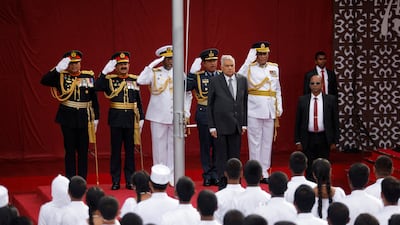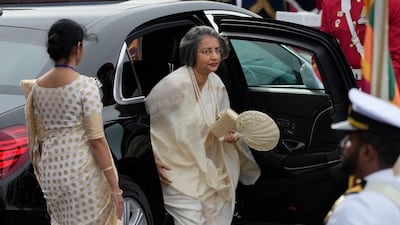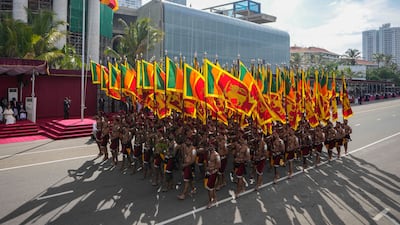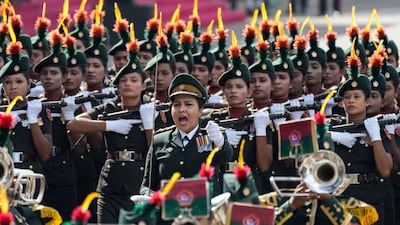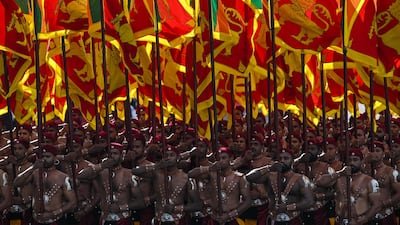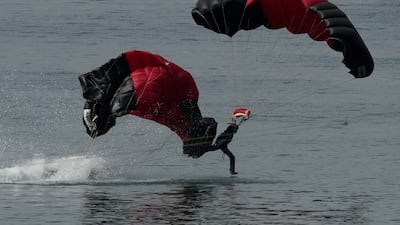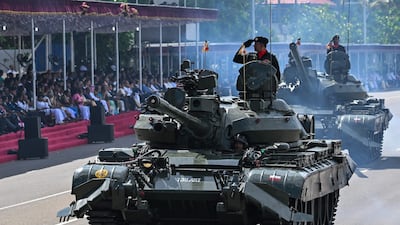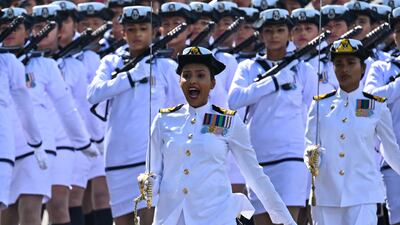Sri Lanka marked 75 years since independence with a sombre military parade on Saturday, as its president urged reflection on “errors and failures” at a time of national crisis.
Since the end of British rule in 1948, the island nation has spent much of its history at war with itself, including a decades-long Tamil separatist rebellion that claimed up to 100,000 lives and two deadly communist insurgencies.
Its 22 million people are still suffering the hardships of an unprecedented economic collapse last year that brought months of food and fuel shortages.
President Ranil Wickremesinghe, who took office last July at the height of the resulting political unrest, said Saturday's anniversary came at “an extremely critical and challenging time”.
“It presents an opportunity for us not only to review our strengths and gains as a nation but also to rectify our errors and failures,” he said.
Mr Wickremesinghe, flanked by senior military officers, watched the hour-long procession of soldiers and army vehicles along a promenade in the capital, Colombo. The parade was boycotted by opposition parties.
For several months last year, the boulevard was home to a protest camp set up by Sri Lankans who were outraged over the island's economic calamity and mismanagement by its leaders.
The protest movement peaked in July when a crowd stormed the home of Gotabaya Rajapaksa, Mr Wickremesinghe's predecessor, and chased him into temporary exile. There, he issued his resignation.
Mr Wickremesinghe ordered security forces to dismantle the camp hours after he was sworn into office and has since set about repairing Sri Lanka's finances.
His government has increased taxes and is negotiating with international creditors including India and China to clear the way for an International Monetary Fund bailout.
“I am confident that even at this juncture we will pool our energies … to rise up from the current economic abyss and build back stronger,” Mr Wickremesinghe said.
But the impact of the crisis is still being acutely felt, with Mr Wickremesinghe saying last week that the economy had contracted by up to 11 per cent in 2022.
On Friday, the UN children's agency reported that nearly one in three Sri Lankans were in need of humanitarian assistance as a result of the downturn.
“Sri Lanka is a bankrupt nation, so we have to start from zero now,” said political analyst Ranga Kalansooriya.
The economic collapse is the latest of several calamities that have befallen Sri Lanka since independence.
Nearly 31,000 people were killed by the 2004 Boxing Day tsunami.
A series of co-ordinated Islamist attacks on hotels and churches during Easter Sunday services in 2019 killed 279 people.
Human rights groups said that up to 40,000 civilians were killed in the final weeks of the decades-long civil war in 2009, during an army assault that crushed the remnants of the Tamil Tigers leadership.
Sri Lanka has resisted international calls for an investigation into war crimes allegations and later governments have been accused of abetting continued discrimination against the island's Tamil minority.
Mr Kalansooriya said Sri Lanka had yet to heal the wounds from the long conflict and its political leaders had failed to bring about reconciliation.
“We needed a Mandela in Sri Lanka,” he said, “but what happened in the aftermath was entirely different.”
